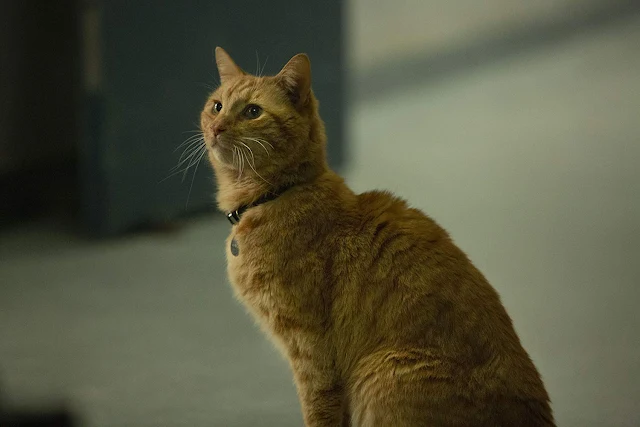A blog formerly known as Bookishness / By Charles Matthews
"Dazzled by so many and such marvelous inventions, the people of Macondo ... became indignant over the living images that the prosperous merchant Bruno Crespi projected in the theater with the lion-head ticket windows, for a character who had died and was buried in one film and for whose misfortune tears had been shed would reappear alive and transformed into an Arab in the next one. The audience, who had paid two cents apiece to share the difficulties of the actors, would not tolerate that outlandish fraud and they broke up the seats. The mayor, at the urging of Bruno Crespi, explained in a proclamation that the cinema was a machine of illusions that did not merit the emotional outbursts of the audience. With that discouraging explanation many ... decided not to return to the movies, considering that they already had too many troubles of their own to weep over the acted-out misfortunes of imaginary beings."--Gabriel García Márquez, One Hundred Years of Solitude
Search This Blog
Showing posts with label Brie Larson. Show all posts
Showing posts with label Brie Larson. Show all posts
Thursday, December 26, 2019
Captain Marvel (Anna Boden, Ryan Fleck, 2019)
Captain Marvel (Anna Boden, Ryan Fleck, 2019)
Cast: Brie Larson, Samuel L. Jackson, Ben Mendelsohn, Jude Law, Annette Bening, Djimon Hounsou, Lee Pace, Lashana Lynch, Gemma Chan, Clark Gregg, Akira Akbar. Screenplay: Anna Boden, Ryan Fleck, Geneva Robertson-Dworet, Nicole Perlman, Meg LeFauve. Cinematography: Ben Davis. Production design: Andy Nicholson. Film editing: Debbie Berman, Elliot Graham. Music: Pinar Toprak.
When I was a kid, Captain Marvel was a big guy in red long-johns and a cape who looked like a swole Fred MacMurray. But now, many years and many lawsuits later, the captain is a woman and my erstwhile superhero has taken on the name Shazam! which was the magic word that Billy Batson used to transform himself. And that's another movie -- not to mention another comics universe -- entirely, one that I hope I hope to see before too long. Captain Marvel the movie is about Carol Danvers and the origin story of her superhero alter ego. Or perhaps I should say one of the origin stories, because if you start rambling around the internet you'll find that the mighty captain has had many personae along the way. Even this origin story is a little head-spinning, involving rival alien races, abduction, amnesia, accidentally acquired superpowers, and much more. Even now, I'm not sure I can tell you for certain whether the Kree and the Skrull are the bad guys or the good guys and where Annette Bening's Dr. Lawson fits into the whole thing. Only my familiarity with Nick Fury and Phil Coulson (Samuel F. Jackson and Clark Gregg, respectively) from other Marvel movies and TV shows makes me think that Carol Danvers is doing the right thing by trusting them. Even my favorite character in the movie, Goose, is a somewhat ambiguous figure, apt to turn into a voracious many-headed monster when provoked. Good kitty. I have long since grown impatient with movies in which the credits run almost as long as the story, so the narrative complexity of Captain Marvel bored me less than the usual CGI foofaraw it sets up. Brie Larson does what she can with a character who, if she's really as invulnerable as the film implies, doesn't hold much chance for challenge and growth. I assume the sequels will show us what her Kryptonite is -- she can't just potter around the universe tidying things up forever.
Wednesday, November 15, 2017
Scott Pilgrim vs. the World (Edgar Wright, 2010)
 |
| Mary Elizabeth Winstead and Michael Cera in Scott Pilgrim vs. the World |
Ramona Flowers: Mary Elizabeth Winstead
Knives Chau: Ellen Wong
Kim Pine: Alison Pill
Stephen Stills: Mark Webber
Young Neil: Johnny Simmons
Wallace Wells: Kieran Culkin
Stacey Pilgrim: Anna Kendrick
Julie Powers: Aubrey Plaza
Matthew Patel: Satya Bhabha
Lucas Lee: Chris Evans
Envy Adams: Brie Larson
Roxy Richter: Mae Whitman
Todd Ingram: Brandon Routh
Gideon Graves: Jason Schwartzman
Director: Edgar Wright
Screenplay: Michael Bacall, Edgar Wright
Cinematography: Bill Pope
Production design: Marcus Rowland
Film editing: Jonathan Amos, Paul Macliss
Edgar Wright's hyperactive but witty Scott Pilgrim vs. the World was a box-office failure, despite being an entertaining farrago of everything in 21st century pop culture: comic books, video games, anime, rock, superhero movies, and so on. Critics generally praised it, but that may have been something of a kiss of death, making it too mainstream for the hip. It has since, as such commercial misfires tend to do, become something of a cult movie, finding its audience as it ages and turns into a nostalgia piece. It gets much of its strength from Michael Cera's performance as the sweet slacker Scott, who plays bass in a garage band and has to balance an inappropriate infatuation with the underage Knives Chau and a more appropriate attraction to the très hip Ramona Flowers. Unfortunately, Ramona has a slate of evil ex-boyfriends, each of whom Scott is obliged to vanquish. Chris Evans and Brandon Routh send up their own superhero roles as two of the evil exes, the former a skateboarding movie star with an entourage of stunt doubles, the latter a bassist for a rival band who gets his superpowers from veganism -- about which he is willing to go on at hilarious length. Presiding over the evil exes is record producer Gideon Graves, sneeringly played by Jason Schwartzman. It's all very silly, but it's also bright and colorful fun if you want a break from reality.
Tuesday, August 9, 2016
Room (Lenny Abrahamson, 2015)
 |
| Jacob Tremblay and Brie Larson in Room |
Subscribe to:
Comments (Atom)







